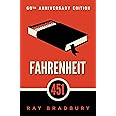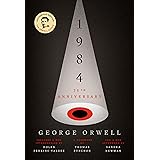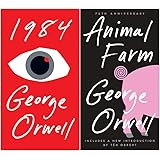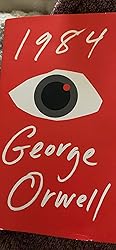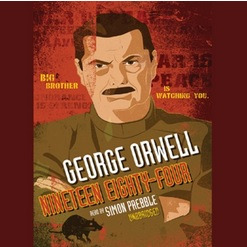
Enjoy fast, free delivery, exclusive deals, and award-winning movies & TV shows with Prime
Try Prime and start saving today with fast, free delivery
Amazon Prime includes:
Fast, FREE Delivery is available to Prime members. To join, select "Try Amazon Prime and start saving today with Fast, FREE Delivery" below the Add to Cart button.
Amazon Prime members enjoy:- Cardmembers earn 5% Back at Amazon.com with a Prime Credit Card.
- Unlimited Free Two-Day Delivery
- Streaming of thousands of movies and TV shows with limited ads on Prime Video.
- A Kindle book to borrow for free each month - with no due dates
- Listen to over 2 million songs and hundreds of playlists
- Unlimited photo storage with anywhere access
Important: Your credit card will NOT be charged when you start your free trial or if you cancel during the trial period. If you're happy with Amazon Prime, do nothing. At the end of the free trial, your membership will automatically upgrade to a monthly membership.
Buy new:
$8.99$8.99
Buy used:
$6.34





Download the free Kindle app and start reading Kindle books instantly on your smartphone, tablet, or computer - no Kindle device required.
Read instantly on your browser with Kindle for Web.
Using your mobile phone camera - scan the code below and download the Kindle app.

 Audible sample Sample
Audible sample Sample



1984: 75th Anniversary Paperback – April 1, 1983
Purchase options and add-ons
This 75th Anniversary Edition includes:
• A New Introduction by Dolen Perkins-Valdez, author of Take My Hand, winner of the 2023 NAACP Image Award for Outstanding Literary Work—Fiction
• A New Afterword by Sandra Newman, author of Julia: A Retelling of George Orwell’s 1984
“The Party told you to reject the evidence of your eyes and ears. It was their final, most essential command.”
Winston Smith toes the Party line, rewriting history to satisfy the demands of the Ministry of Truth. With each lie he writes, Winston grows to hate the Party that seeks power for its own sake and persecutes those who dare to commit thoughtcrimes. But as he starts to think for himself, Winston can’t escape the fact that Big Brother is always watching...
A startling and haunting novel, 1984 creates an imaginary world that is completely convincing from start to finish. No one can deny the novel’s hold on the imaginations of whole generations, or the power of its admonitions—a power that seems to grow, not lessen, with the passage of time.
• Nominated as one of America’s best-loved novels by PBS’s The Great American Read •
-
Print length320 pages
-
LanguageEnglish
-
Lexile measure1090L
-
Dimensions5.27 x 0.65 x 7.94 inches
-
PublisherBerkley
-
Publication dateApril 1, 1983
-
ISBN-100452262933
-
ISBN-13978-0452262935
The Amazon Book Review
Book recommendations, author interviews, editors' picks, and more. Read it now.
Frequently bought together
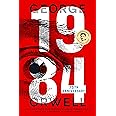
Similar items that may ship from close to you
Editorial Reviews
About the Author
Excerpt. © Reprinted by permission. All rights reserved.
ONE
It was a bright cold day in April, and the clocks were striking thirteen. Winston Smith, his chin nuzzled into his breast in an effort to escape the vile wind, slipped quickly through the glass doors of Victory Mansions, though not quickly enough to prevent a swirl of gritty dust from entering along with him.
The hallway smelt of boiled cabbage and old rag mats. At one end of it a colored poster, too large for indoor display, had been tacked to the wall. It depicted simply an enormous face, more than a meter wide: the face of a man of about forty-five, with a heavy black mustache and ruggedly handsome features. Winston made for the stairs. It was no use trying the lift. Even at the best of times it was seldom working, and at present the electric current was cut off during daylight hours. It was part of the economy drive in preparation for Hate Week. The flat was seven flights up, and Winston, who was thirty-nine, and had a varicose ulcer above his right ankle, went slowly, resting several times on the way. On each landing, opposite the lift shaft, the poster with the enormous face gazed from the wall. It was one of those pictures which are so contrived that the eyes follow you about when you move. BIG BROTHER IS WATCHING YOU, the caption beneath it ran.
Inside the flat a fruity voice was reading out a list of figures which had something to do with the production of pig iron. The voice came from an oblong metal plaque like a dulled mirror which formed part of the surface of the right-hand wall. Winston turned a switch and the voice sank somewhat, though the words were still distinguishable. The instrument (the telescreen, it was called) could be dimmed, but there was no way of shutting it off completely. He moved over to the window: a smallish, frail figure, the meagerness of his body merely emphasized by the blue overalls which were the uni- form of the Party. His hair was very fair, his face naturally sanguine, his skin roughened by coarse soap and blunt razor blades and the cold of the winter that had just ended.
Outside, even through the shut window pane, the world looked cold. Down in the street little eddies of wind were whirling dust and torn paper into spirals, and though the sun was shining and the sky a harsh blue, there seemed to be no color in anything except the posters that were plastered every- where. The black-mustachio’d face gazed down from every commanding corner. There was one on the house front immediately opposite. BIG BROTHER IS WATCHING YOU, the caption said, while the dark eyes looked deep into Winston’s own. Down at street level another poster, torn at one corner, flapped fitfully in the wind, alternately covering and uncovering the single word INGSOC. In the far distance a helicopter skimmed down between the roofs, hovered for an instant like a blue-bottle, and darted away again with a curving flight. It was the Police Patrol, snooping into people’s windows. The patrols did not matter, however. Only the Thought Police mattered.
Behind Winston’s back the voice from the telescreen was still babbling away about pig iron and the overfulfillment of the Ninth Three-Year Plan. The telescreen received and transmitted simultaneously. Any sound that Winston made, above the level of a very low whisper, would be picked up by it; moreover, so long as he remained within the field of vision which the metal plaque commanded, he could be seen as well as heard. There was of course no way of knowing whether you were being watched at any given moment. How often, or on what system, the Thought Police plugged in on any individual wire was guesswork. It was even conceivable that they watched everybody all the time. But at any rate they could plug in your wire whenever they wanted to. You had to live— did live, from habit that became instinct—in the assumption that every sound you made was overheard, and, except in darkness, every movement scrutinized.
Winston kept his back turned to the telescreen. It was safer; though, as he well knew, even a back can be revealing. A kilometer away the Ministry of Truth, his place of work, towered vast and white above the grimy landscape. This, he thought with a sort of vague distaste—this was London, chief city of Airstrip One, itself the third most populous of the provinces of Oceania. He tried to squeeze out some childhood memory that should tell him whether London had always been quite like this. Were there always these vistas of rotting nineteenth- century houses, their sides shored up with balks of timber, their windows patched with cardboard and their roofs with corrugated iron, their crazy garden walls sagging in all directions? And the bombed sites where the plaster dust swirled in the air and the willow herb straggled over the heaps of rubble; and the places where the bombs had cleared a larger path and there had sprung up sordid colonies of wooden dwellings like chicken houses? But it was no use, he could not remember: nothing remained of his childhood except a series of bright-lit tableaux, occurring against no background and mostly unintelligible.
The Ministry of Truth—Minitrue, in Newspeak*—was startlingly different from any other object in sight. It was an enormous pyramidal structure of glittering white concrete, soaring up, terrace after terrace, three hundred meters into the air. From where Winston stood it was just possible to read, picked out on its white face in elegant lettering, the three slogans of the Party:
WAR IS PEACE FREEDOM IS SLAVERY
IGNORANCE IS STRENGTH.
Product details
- Publisher : Berkley; 60th Anniversary edition (April 1, 1983)
- Language : English
- Paperback : 320 pages
- ISBN-10 : 0452262933
- ISBN-13 : 978-0452262935
- Reading age : 16+ years, from customers
- Lexile measure : 1090L
- Item Weight : 8 ounces
- Dimensions : 5.27 x 0.65 x 7.94 inches
- Best Sellers Rank: #100,412 in Books (See Top 100 in Books)
- #343 in Political Fiction (Books)
- #1,262 in Dystopian Fiction (Books)
- #3,256 in Classic Literature & Fiction
- Customer Reviews:
About the authors
-

George Orwell is one of England's most famous writers and social commentators. Among his works are the classic political satire Animal Farm and the dystopian nightmare vision Nineteen Eighty-Four. Orwell was also a prolific essayist, and it is for these works that he was perhaps best known during his lifetime. They include Why I Write and Politics and the English Language. His writing is at once insightful, poignant and entertaining, and continues to be read widely all over the world.
Eric Arthur Blair (George Orwell) was born in 1903 in India, where his father worked for the Civil Service. The family moved to England in 1907 and in 1917 Orwell entered Eton, where he contributed regularly to the various college magazines. From 1922 to 1927 he served with the Indian Imperial Police in Burma, an experience that inspired his first novel, Burmese Days (1934). Several years of poverty followed. He lived in Paris for two years before returning to England, where he worked successively as a private tutor, schoolteacher and bookshop assistant, and contributed reviews and articles to a number of periodicals. Down and Out in Paris and London was published in 1933. In 1936 he was commissioned by Victor Gollancz to visit areas of mass unemployment in Lancashire and Yorkshire, and The Road to Wigan Pier (1937) is a powerful description of the poverty he saw there.
At the end of 1936 Orwell went to Spain to fight for the Republicans and was wounded. Homage to Catalonia is his account of the civil war. He was admitted to a sanatorium in 1938 and from then on was never fully fit. He spent six months in Morocco and there wrote Coming Up for Air. During the Second World War he served in the Home Guard and worked for the BBC Eastern Service from 1941 to 1943. As literary editor of the Tribune he contributed a regular page of political and literary commentary, and he also wrote for the Observer and later for the Manchester Evening News. His unique political allegory, Animal Farm was published in 1945, and it was this novel, together with Nineteen Eighty-Four (1949), which brought him world-wide fame.
It was around this time that Orwell's unique political allegory Animal Farm (1945) was published. The novel is recognised as a classic of modern political satire and is simultaneously an engaging story and convincing allegory. It was this novel, together with Nineteen Eighty-Four (1949), which finally brought him world-wide fame. Nineteen Eighty-Four's ominous depiction of a repressive, totalitarian regime shocked contemporary readers, but ensures that the book remains perhaps the preeminent dystopian novel of modern literature.
Orwell's fiercely moral writing has consistently struck a chord with each passing generation. The intense honesty and insight of his essays and non-fiction made Orwell one of the foremost social commentators of his age. Added to this, his ability to construct elaborately imaginative fictional worlds, which he imbued with this acute sense of morality, has undoubtedly assured his contemporary and future relevance.
George Orwell died in London in January 1950.
-

The only place you will need for any book you want.
-

Author shows rich interest in Political Philosophers and their Philosophies. Book "Political Philosophers and Philosophies" is his first short E-Book available on Amazon Kindle.
He has written Political Science optional book in both English and Hindi medium.
Customer reviews
Customer Reviews, including Product Star Ratings help customers to learn more about the product and decide whether it is the right product for them.
To calculate the overall star rating and percentage breakdown by star, we don’t use a simple average. Instead, our system considers things like how recent a review is and if the reviewer bought the item on Amazon. It also analyzed reviews to verify trustworthiness.
Learn more how customers reviews work on AmazonReviews with images
-
Top reviews
Top reviews from the United States
There was a problem filtering reviews right now. Please try again later.
Many have read this book early in their youth, most likely as part of their educational upbringing. 1984 and Animal Farm are standard, pedantic texts battle ready for disaffected youth to sink their teeth into. This book, among the greats, seems boundless in the echoes and touchstones resounding within its tome. In revisiting the text many years later, one will find that Orwell’s words seem strangely even more relevant than they were at first blanch. Perhaps even more so than they were when original meted out and scratched into paper during the author’s self-imposed exile in the Scottish isle that was his final home so many years ago.
There are so many elements here that have such deep and broad depth that will keep this work of literature relevant for many more years. Orwell invented the terms “Big Brother” and “Thought Crime” and dove unrepentantly into issues of privacy, personal freedom and individualism. All this before the revolution of the internet! He also fretted over the degradation of language (OMG!) and the breakdown and bastardization of society’s communal bonds, family bonds, bonds of friendship and the abolishment of simple love. His vision of a mechanized society (one that even turns books out by machines), is more than a decry by a luddite so much as it concerns the debasement or obliteration of the individual and sense of self.
Orwell’s main thrust seems to be right at the heart of man and the core inner lust for domination and power, simply for its own sake. That ever-present evolutionary tendency to thrive at all costs without purpose or direction, and the ability of that singular impetus to take over and distort all else toward its own end. He digs that up out of the blackest parts of the human heart and disgorges it upon the shoreline of society receding tide as if to say, “This too is what you are. Do not kid yourself.”
For me, this book was rough. The tone was bleak. Throughout. Unflinchingly somber and hopeless. Yet, the story of the protagonist and his struggle amid this world turned upside down, is relatable and believable. Despite the obvious despair and immeasurable odds, we do feel for Winston Smith (the protagonist) and we do root for him. We follow him in his desperation to find something, some way to express himself and make a dent in the impenetrable wall that has become the totalitarian society which he is a part. We feel his constant fear and ever present distrust of everything—almost. The little glimmers of possibilities, even when they are squashed, keep your interest and balance the grim-gray that pervades everything.
One thing that struck me was that the female character Julia, is an interesting addition. She has a good amount of gumption and serves more than just a goal or love interest. She is fleshed out pretty well and adds a lot of dimension to the story by sharing the protagonist’s goals, but also coming from a slightly different more realistic viewpoint.
Another thing I found interesting in reading this book in present time was how insular the story is. We are just as stuck as the protagonist. All news of the outside world and the society is filtered to the reader through the regime in power. We never really know who to trust or when something might be real or made up or mere speculation. Nothing ever really seems certain. The story never ever escapes this – there is never an Oz-like “Man behind the Curtain” moment. Not really. We are told how some things work, and sometimes by sources that are deemed more reliable than others, but we don’t truly find out.
This tight view point, keeps up a claustrophobic feeling that forces the storyline to remain connected to the protagonist’s individual struggle. Even though Winston Smith is concerned with larger concepts and a revolutionary struggle on a society level–the story remains individualistic. However, the tale is not a man’s struggle with himself, it is a man’s struggle to find himself among others; the interrelatedness of things and how important that is. The totalitarian regime in power has distorted this effect and is manifesting control by continually putting up road blocks and pseudo-constructed, societal norms to hamper true progress and growth.
Even still, the individual struggles to find their place in society. As the story goes on, I think it is clear that most of this doomed society continues to struggle with this. And the powers that be, must expend an immense amount of effort and expense to constantly suppress this. In the end, can that really work? Have a care. Big Brother is watching.
Podcast: If you enjoy my review (or this topic) this book and the movie based on it were further discussed/debated in a lively discussion on my podcast: "No Deodorant In Outer Space". The podcast is available on iTunes, YouTube or our website.
“The Party” is described as an unknown higher power that has total influence over its citizens. It is clear that the Party has manipulated its citizens to think in a “certain way”. One way they manipulate the citizens is the rewritten text from the past. The mutability of history causes citizens to believe that some make believe figures and events actually existed when in reality, it was created in favor of the Party. This is described when Orwell states “Who controls the past,’ ran the Party slogan, ‘controls the future: who controls the present controls the past.” Winston participated in this when he invented a figure named “Comrade Ogilvy”. This idea is a parallel to real life because in different countries, certain events are rewritten to appear patriotic towards the country. Another example of government manipulation is the widespread propaganda. Citizens were forced to view advertisements of hate towards “The Brotherhood” (anti-government) group and Goldstein (Brotherhood leader). Citizens also participated in a week long event called “Hate Week” which was designed to ignite anger and hatred towards the “enemy”. Telescreens were also posted everywhere in order to keep track of the citizens' lives. These ideas are controversial to today’s society. Many are weary of the government spying on our actions through webcams and cell phones. During election season, propaganda of leaders can be seen to create hate similar to how the Party forces propaganda to its citizens. There are three slogans the Party lives by: “War is peace. Freedom is slavery. Ignorance is strength”. Citizens of Oceania live by these quotes believing it is the correct ideas because the Party constantly repeats it. The parallel for this is that there are certain ideas that some countries live by that overall can be dangerous towards its citizens. The idea of government manipulation in 1984 is an eye-opening experience to read and will make any reader question whether any of these practices are happening in their real life.
Social class issues were presented with the story through a concept called “Inner Party” and “Outer Party”. The “Inner Party” is the high and elite class of citizens of Oceania and they have less privileges than the “Outer Party”. The “Outer Party” is described as the “middle class” of the story. Most are given government jobs however, they are the most threatening to the government because they are intelligent enough to start a revolution. There are also the “Proles” that have poorer conditions than the “Outer Power” and makes up 85% of the population. The Party controls the “Proles” by exposing them to vices such as alcohol and pornography; furthermore, they are considered and viewed as animals. This social class system can be seen in today’s society. For example, in the United States, the “Inner Party” is compared to the “Top 1%”. The “Outer Party” makes up the middle working class. Though not as extreme as described in the book, the “Proles” can compare to the rest of America’s population: low working wages and mostly involved in vices as well. In the book, Winston writes “If there is any hope, it lies with the Proles” meaning that if there is any hope for change for the regime, it would start the majority of the population. This is an idea that is popular in American politics. Leaders tend to campaign towards the low working class population because they know there is more of “them” in the population to vote. This theme can bring attention to the reader and persuade them to understand how their society is composed and “controlled by the government”.
“1984” was one of the first books to explore the ideas of change and “free thinking”. This caused many institutions to ban this book, which is ironic because censorship was one of the ways the Party manipulated its citizens. I would recommend this book to encourage conversations about individualism and power.
Top reviews from other countries
Writing a critique about Britain’s social stratification and economic inequality in Animal Farm. And, the dangers of the corruption of the revolution. Whilst warning about the great existential threat of authoritarianism in the later story 1984.
In this novel, the author does an excellent job of imagining what ordinary people endure in a modern totalitarian state e.g. Soviet Russia in the past and North Korea today. The deification of the great leader.Mind control through the manipulation of culture (Hate Week), language (Newspeak) and memory (redacting history).
In a mere dictatorship, the masses are cowed by the threat of violence. In the 20th Century, total control would ensure total obedience because people would have no other point of reference. Ordinary people are turned against each other. Dissidents become fervent believers in the state.
In a world full of conflict and fear, there is the great temptation of creating an Islamist state, fundamentalist society, or super empire. One ring to rule them all!!!!
One of the benchmarks in English literature, it really should be on everybody's book shelf (or kindle).
Gripping. Still contemporary. For newcomers to the book, it is easy to read and understand. A real page-turner.





